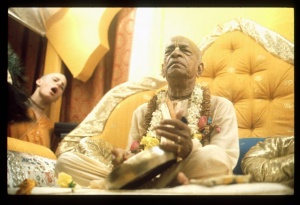SB 10.4.38: Difference between revisions
(Vanibot #0018 edit: make synonym terms in Sanskrit italic in SB - Vanisource) |
(Vanibot #0054 edit - transform synonyms into clickable links, which search similar occurrences) |
||
| Line 23: | Line 23: | ||
<div class="synonyms"> | <div class="synonyms"> | ||
''yathā'' | ''[//vanipedia.org/wiki/Special:VaniSearch?s=yathā&tab=syno_o&ds=1 yathā]'' — as; ''[//vanipedia.org/wiki/Special:VaniSearch?s=āmayaḥ&tab=syno_o&ds=1 āmayaḥ]'' — a disease; ''[//vanipedia.org/wiki/Special:VaniSearch?s=aṅge&tab=syno_o&ds=1 aṅge]'' — in the body; ''[//vanipedia.org/wiki/Special:VaniSearch?s=samupekṣitaḥ&tab=syno_o&ds=1 samupekṣitaḥ]'' — being neglected; ''[//vanipedia.org/wiki/Special:VaniSearch?s=nṛbhiḥ&tab=syno_o&ds=1 nṛbhiḥ]'' — by men; ''[//vanipedia.org/wiki/Special:VaniSearch?s=na&tab=syno_o&ds=1 na]'' — not; ''[//vanipedia.org/wiki/Special:VaniSearch?s=śakyate&tab=syno_o&ds=1 śakyate]'' — is able; ''[//vanipedia.org/wiki/Special:VaniSearch?s=rūḍha&tab=syno_o&ds=1 rūḍha]-[//vanipedia.org/wiki/Special:VaniSearch?s=padaḥ&tab=syno_o&ds=1 padaḥ]'' — when it is acute; ''[//vanipedia.org/wiki/Special:VaniSearch?s=cikitsitum&tab=syno_o&ds=1 cikitsitum]'' — to be treated; ''[//vanipedia.org/wiki/Special:VaniSearch?s=yathā&tab=syno_o&ds=1 yathā]'' — and as; ''[//vanipedia.org/wiki/Special:VaniSearch?s=indriya&tab=syno_o&ds=1 indriya]-[//vanipedia.org/wiki/Special:VaniSearch?s=grāmaḥ&tab=syno_o&ds=1 grāmaḥ]'' — the senses; ''[//vanipedia.org/wiki/Special:VaniSearch?s=upekṣitaḥ&tab=syno_o&ds=1 upekṣitaḥ]'' — not controlled in the beginning; ''[//vanipedia.org/wiki/Special:VaniSearch?s=tathā&tab=syno_o&ds=1 tathā]'' — similarly; ''[//vanipedia.org/wiki/Special:VaniSearch?s=ripuḥ&tab=syno_o&ds=1 ripuḥ] [//vanipedia.org/wiki/Special:VaniSearch?s=mahān&tab=syno_o&ds=1 mahān]'' — a great enemy; ''[//vanipedia.org/wiki/Special:VaniSearch?s=baddha&tab=syno_o&ds=1 baddha]-[//vanipedia.org/wiki/Special:VaniSearch?s=balaḥ&tab=syno_o&ds=1 balaḥ]'' — if he becomes strong; ''[//vanipedia.org/wiki/Special:VaniSearch?s=na&tab=syno_o&ds=1 na]'' — not; ''[//vanipedia.org/wiki/Special:VaniSearch?s=cālyate&tab=syno_o&ds=1 cālyate]'' — can be controlled. | ||
</div> | </div> | ||
Latest revision as of 18:58, 17 February 2024

His Divine Grace
A.C. Bhaktivedanta Swami Prabhupada
A.C. Bhaktivedanta Swami Prabhupada
TEXT 38
- yathāmayo 'ṅge samupekṣito nṛbhir
- na śakyate rūḍha-padaś cikitsitum
- yathendriya-grāma upekṣitas tathā
- ripur mahān baddha-balo na cālyate
SYNONYMS
yathā — as; āmayaḥ — a disease; aṅge — in the body; samupekṣitaḥ — being neglected; nṛbhiḥ — by men; na — not; śakyate — is able; rūḍha-padaḥ — when it is acute; cikitsitum — to be treated; yathā — and as; indriya-grāmaḥ — the senses; upekṣitaḥ — not controlled in the beginning; tathā — similarly; ripuḥ mahān — a great enemy; baddha-balaḥ — if he becomes strong; na — not; cālyate — can be controlled.
TRANSLATION
As a disease, if initially neglected, becomes acute and impossible to cure, or as the senses, if not controlled at first, are impossible to control later, an enemy, if neglected in the beginning, later becomes insurmountable.